【精品】情态动词详解+例句
- 格式:doc
- 大小:82.00 KB
- 文档页数:12
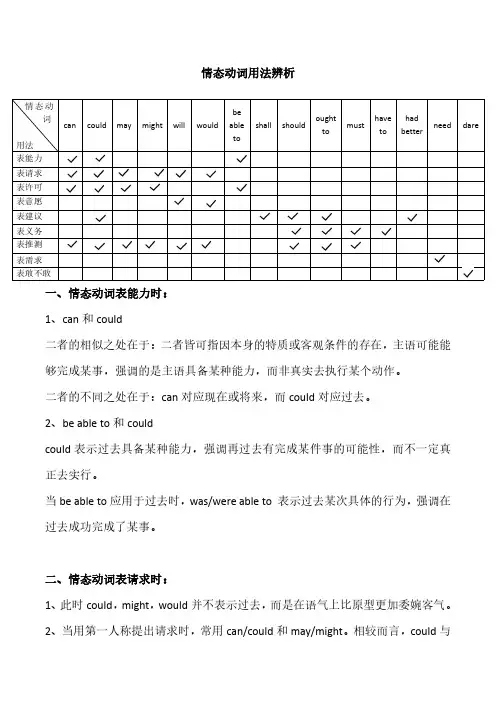
情态动词用法辨析情态动词用法can could may might will would be able to shall should ought to must have to had better need dare表能力表请求表许可表意愿表建议表义务表推测表需求表敢不敢一、情态动词表能力时:1、can 和could二者的相似之处在于:二者皆可指因本身的特质或客观条件的存在,主语可能能够完成某事,强调的是主语具备某种能力,而非真实去执行某个动作。
二者的不同之处在于:can 对应现在或将来,而could 对应过去。
2、be able to 和couldcould 表示过去具备某种能力,强调再过去有完成某件事的可能性,而不一定真正去实行。
当be able to 应用于过去时,was/were able to 表示过去某次具体的行为,强调在过去成功完成了某事。
二、情态动词表请求时:1、此时could ,might ,would 并不表示过去,而是在语气上比原型更加委婉客气。
2、当用第一人称提出请求时,常用can/could 和may/might 。
相较而言,could 与may在表请求的问句中出现的频率最高;might表发请求的语气最为委婉客气,因此反而很少见;而can则常用于熟人间的对话中。
语气强度:can>could/might>might3、当用第二人称提出请求时,常用can/could和will/would。
其中could和would 表达请求的语气更委婉客气;而can与will则常用于熟人对话中。
语气强度:can/will>could/would三、情态动词表许可时:1、与表请求不同,will/would不论前接第几人称,都表示主语本身的意愿,无需得到他人的“许可”,所以will/would不可以用于表请求的句中。
2、can和may二者都可以表示对现在或将来动作的许可,其中can的使用频率更高。
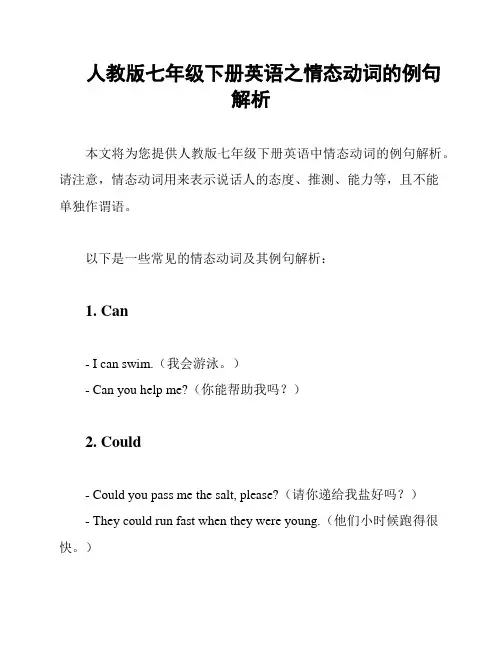
人教版七年级下册英语之情态动词的例句解析本文将为您提供人教版七年级下册英语中情态动词的例句解析。
请注意,情态动词用来表示说话人的态度、推测、能力等,且不能单独作谓语。
以下是一些常见的情态动词及其例句解析:1. Can- I can swim.(我会游泳。
)- Can you help me?(你能帮助我吗?)2. Could- Could you pass me the salt, please?(请你递给我盐好吗?)- They could run fast when they were young.(他们小时候跑得很快。
)3. May- May I use your phone?(我可以用一下你的手机吗?)- It may rain tomorrow.(明天可能会下雨。
)4. Might- He might be late for the meeting.(他可能会迟到开会。
)- I might go to the party if I finish my work early.(如果我早完工了可能会去参加派对。
)5. Shall- Shall we go out for dinner tonight?(我们今晚出去吃饭好吗?)- Shall I help you with your homework?(我帮你做作业好吗?)6. Should- You should eat more fruits and vegetables.(你应该多吃水果和蔬菜。
)- We should study for the exam.(我们应该为考试而研究。
)7. Must- I must finish my project before the deadline.(我必须在截止日期之前完成我的项目。
)- You must wear a seatbelt in the car.(你在车里必须系安全带。
)以上是情态动词的一些例句解析,希望对您有帮助。
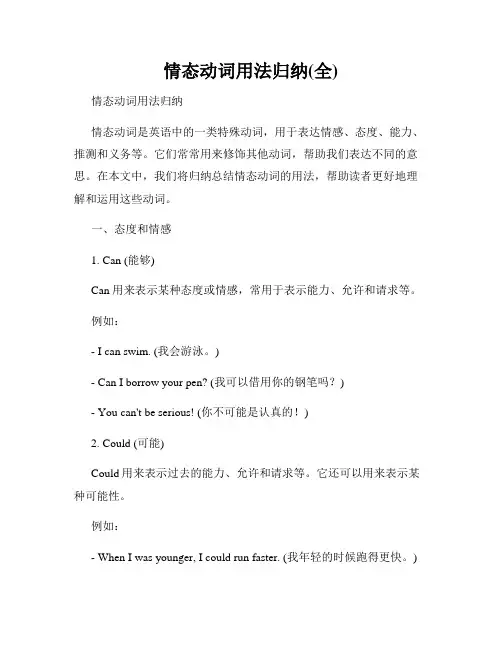
情态动词用法归纳(全)情态动词用法归纳情态动词是英语中的一类特殊动词,用于表达情感、态度、能力、推测和义务等。
它们常常用来修饰其他动词,帮助我们表达不同的意思。
在本文中,我们将归纳总结情态动词的用法,帮助读者更好地理解和运用这些动词。
一、态度和情感1. Can (能够)Can用来表示某种态度或情感,常用于表示能力、允许和请求等。
例如:- I can swim. (我会游泳。
)- Can I borrow your pen? (我可以借用你的钢笔吗?)- You can't be serious! (你不可能是认真的!)2. Could (可能)Could用来表示过去的能力、允许和请求等。
它还可以用来表示某种可能性。
例如:- When I was younger, I could run faster. (我年轻的时候跑得更快。
)- Could I ask you a question? (我可以问你一个问题吗?)- It could rain later, so bring an umbrella. (今天后面可能会下雨,所以带上雨伞。
)3. May (可能)May常表示许可、请求和推测等。
它还可以用来表示某种可能性或希望。
例如:- May I use your phone? (我可以用一下你的手机吗?)- It may rain tomorrow. (明天可能会下雨。
)- They may arrive late. (他们可能会迟到。
)4. Might (可能)Might与may的用法类似,但表示的可能性稍微低一些。
例如:- She might be busy. (她可能很忙。
)- I might go to the party, but I'm not sure yet. (我可能会去参加派对,但我还不确定。
)二、能力和推测1. Must (必须)Must用来表示强烈的推断或必要性。
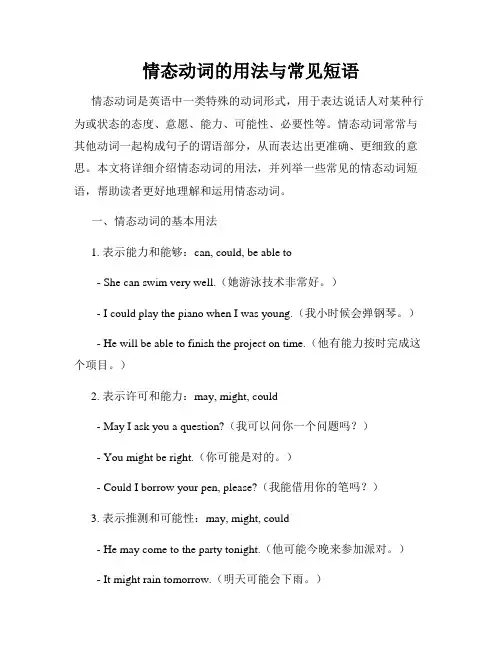
情态动词的用法与常见短语情态动词是英语中一类特殊的动词形式,用于表达说话人对某种行为或状态的态度、意愿、能力、可能性、必要性等。
情态动词常常与其他动词一起构成句子的谓语部分,从而表达出更准确、更细致的意思。
本文将详细介绍情态动词的用法,并列举一些常见的情态动词短语,帮助读者更好地理解和运用情态动词。
一、情态动词的基本用法1. 表示能力和能够:can, could, be able to- She can swim very well.(她游泳技术非常好。
)- I could play the piano when I was young.(我小时候会弹钢琴。
) - He will be able to finish the project on time.(他有能力按时完成这个项目。
)2. 表示许可和能力:may, might, could- May I ask you a question?(我可以问你一个问题吗?)- You might be right.(你可能是对的。
)- Could I borrow your pen, please?(我能借用你的笔吗?)3. 表示推测和可能性:may, might, could- He may come to the party tonight.(他可能今晚来参加派对。
) - It might rain tomorrow.(明天可能会下雨。
)- The train could be late.(火车可能会晚点。
)4. 表示建议和义务:should, ought to, had better- You should apologize to her.(你应该向她道歉。
)- We ought to help those in need.(我们应该帮助有需要的人。
) - You'd better take an umbrella with you.(你最好带把伞。
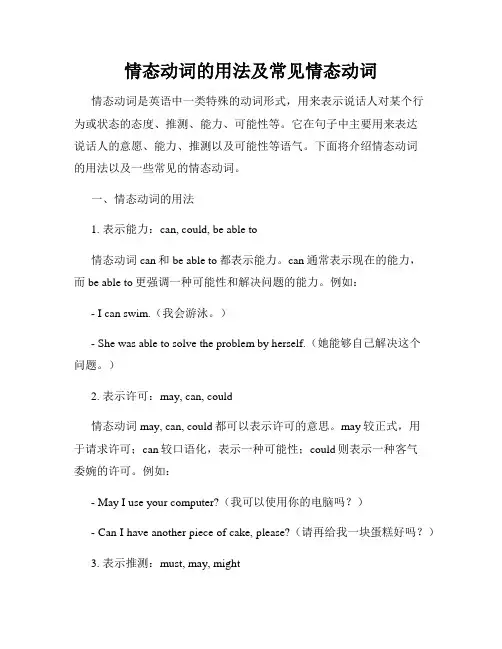
情态动词的用法及常见情态动词情态动词是英语中一类特殊的动词形式,用来表示说话人对某个行为或状态的态度、推测、能力、可能性等。
它在句子中主要用来表达说话人的意愿、能力、推测以及可能性等语气。
下面将介绍情态动词的用法以及一些常见的情态动词。
一、情态动词的用法1. 表示能力:can, could, be able to情态动词can和be able to都表示能力。
can通常表示现在的能力,而be able to更强调一种可能性和解决问题的能力。
例如:- I can swim.(我会游泳。
)- She was able to solve the problem by herself.(她能够自己解决这个问题。
)2. 表示许可:may, can, could情态动词may, can, could都可以表示许可的意思。
may较正式,用于请求许可;can较口语化,表示一种可能性;could则表示一种客气委婉的许可。
例如:- May I use your computer?(我可以使用你的电脑吗?)- Can I have another piece of cake, please?(请再给我一块蛋糕好吗?)3. 表示推测:must, may, might情态动词must表示说话人对某个事实的肯定推测;may和might则表示可能性。
may较肯定,而might较委婉。
例如:- He must be tired, as he worked all day.(他一定很累,因为他整天都在工作。
)- She may/might be late.(她可能会迟到。
)4. 表示必须:must, have to情态动词must表示说话人对某个行为的强制性要求;have to则表示客观上的必须。
例如:- You must finish your homework before you go out.(你必须在出门前完成作业。
)- I have to go to work tomorrow.(我明天必须去上班。
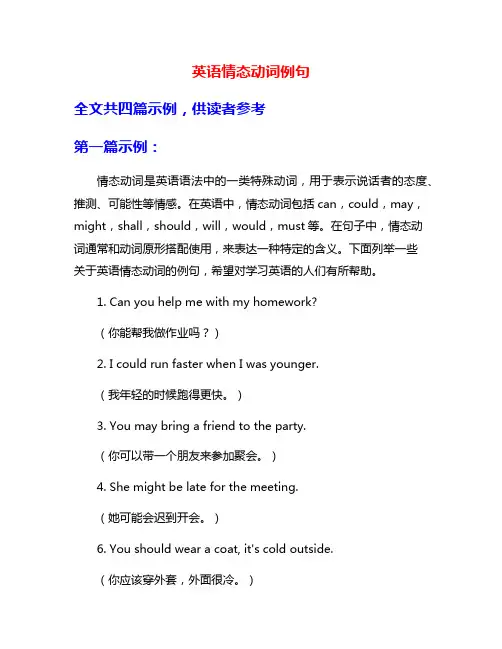
英语情态动词例句全文共四篇示例,供读者参考第一篇示例:情态动词是英语语法中的一类特殊动词,用于表示说话者的态度、推测、可能性等情感。
在英语中,情态动词包括can,could,may,might,shall,should,will,would,must等。
在句子中,情态动词通常和动词原形搭配使用,来表达一种特定的含义。
下面列举一些关于英语情态动词的例句,希望对学习英语的人们有所帮助。
1. Can you help me with my homework?(你能帮我做作业吗?)2. I could run faster when I was younger.(我年轻的时候跑得更快。
)3. You may bring a friend to the party.(你可以带一个朋友来参加聚会。
)4. She might be late for the meeting.(她可能会迟到开会。
)6. You should wear a coat, it's cold outside.(你应该穿外套,外面很冷。
)10. He can speak three languages fluently.(他能流利地讲三种语言。
)14. Shall we dance together?(我们一起跳舞吧?)17. If it snows, we would have a snowball fight.(如果下雪了,我们就会打雪仗。
)20. She could have been a doctor if she had gone to medical school.(如果她去医学院了,她本来可以当医生的。
)以上是关于英语情态动词的例句,希望能帮助大家更好地了解和运用这一语法知识,提高英语表达能力。
希朝世界观友在学习英语的过程中能够多加练习,加深对情态动词的理解,提升自己的语言能力。
第二篇示例:英语情态动词是一类特殊的动词,用来表达说话者对某种行为或状态的态度。
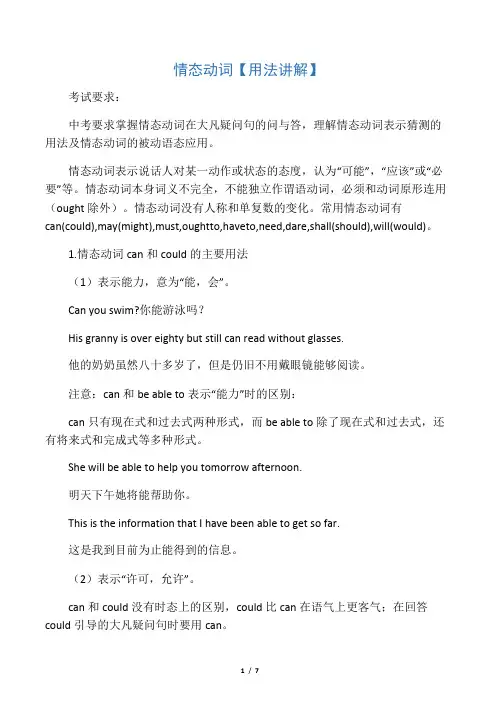
情态动词【用法讲解】考试要求:中考要求掌握情态动词在大凡疑问句的问与答,理解情态动词表示猜测的用法及情态动词的被动语态应用。
情态动词表示说话人对某一动作或状态的态度,认为“可能”,“应该”或“必要”等。
情态动词本身词义不完全,不能独立作谓语动词,必须和动词原形连用(ought除外)。
情态动词没有人称和单复数的变化。
常用情态动词有can(could),may(might),must,oughtto,haveto,need,dare,shall(should),will(would)。
1.情态动词can和could的主要用法(1)表示能力,意为“能,会”。
Can you swim?你能游泳吗?His granny is over eighty but still can read without glasses.他的奶奶虽然八十多岁了,但是仍旧不用戴眼镜能够阅读。
注意:can和be able to表示“能力”时的区别:can只有现在式和过去式两种形式,而be able to除了现在式和过去式,还有将来式和完成式等多种形式。
She will be able to help you tomorrow afternoon.明天下午她将能帮助你。
This is the information that I have been able to get so far.这是我到目前为止能得到的信息。
(2)表示“许可,允许”。
can和could没有时态上的区别,could比can在语气上更客气;在回答could引导的大凡疑问句时要用can。
Could/Can you tell me the way to the railway station?你能告诉我去火车站的路吗?—Could I use your pen?我可以用你的钢笔吗?—Yes, of course you can.是,当然你可以。
(3)表示“可能”,can多用于否定句和疑问句。
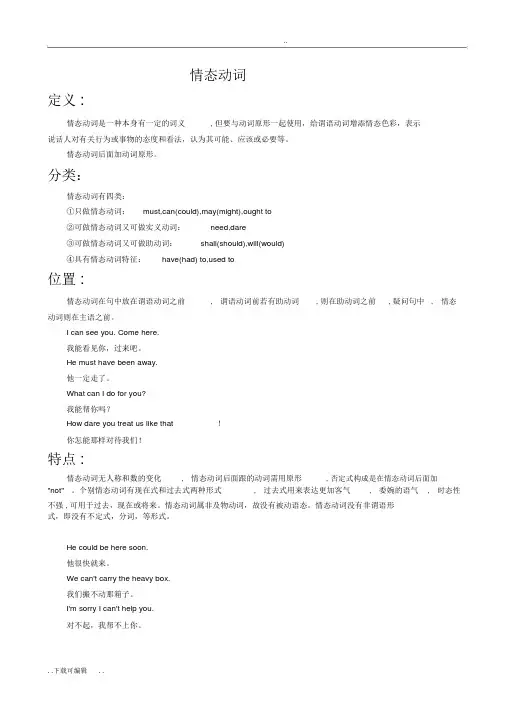
..情态动词定义 :情态动词是一种本身有一定的词义, 但要与动词原形一起使用,给谓语动词增添情态色彩,表示说话人对有关行为或事物的态度和看法,认为其可能、应该或必要等。
情态动词后面加动词原形。
分类:情态动词有四类:①只做情态动词:must,can(could),may(might),ought to②可做情态动词又可做实义动词:need,dare③可做情态动词又可做助动词:shall(should),will(would)④具有情态动词特征:have(had) to,used to位置 :情态动词在句中放在谓语动词之前,谓语动词前若有助动词, 则在助动词之前, 疑问句中,情态动词则在主语之前。
I can see you. Come here.我能看见你,过来吧。
He must have been away.他一定走了。
What can I do for you?我能帮你吗?How dare you treat us like that!你怎能那样对待我们!特点 :情态动词无人称和数的变化,情态动词后面跟的动词需用原形, 否定式构成是在情态动词后面加"not"。
个别情态动词有现在式和过去式两种形式,过去式用来表达更加客气,委婉的语气,时态性不强 , 可用于过去,现在或将来。
情态动词属非及物动词,故没有被动语态。
情态动词没有非谓语形式,即没有不定式,分词,等形式。
He could be here soon.他很快就来。
We can't carry the heavy box.我们搬不动那箱子。
I'm sorry I can't help you.对不起,我帮不上你。
..基本助动词与情态助动词最主要的区别之一是,基本助动词本身没有词义,而情态助动词则有自己的词义,能表示说话人对有关动作或状态的看法,或表示主观设想:What have you been doing since?(构成完成进行体,本身无词义)I am afraid I must be going.(一定要)You may have read some account of the matter.(或许已经)除此之外,情态助动词还有如下词法和句法特征:1 )除ought和used以外,其他情态动词后面只能接不带to的不定式。

情态动词的用法归纳情态动词是一类帮助表达情态、态度、推测、建议和能力等含义的动词。
以下是情态动词的常见用法:1. 表示能力与能力推测:- can例句:I can swim.(我会游泳。
)- could例句:He could swim when he was five.(他五岁时就会游泳了。
)2. 表示许可与禁止:- may例句:You may use my phone.(你可以用我的手机。
)- might例句:I might go to the party tonight.(我可能今晚去参加派对。
)- mustn't例句:You mustn't smoke here.(你不能在这里抽烟。
)3. 表示推测与推测的否定:- may例句:He may be late.(他可能会迟到。
)- might例句:It might rain later.(天后可能会下雨。
)- can't例句:They can't be at home.(他们不可能在家。
)4. 表示义务与责任:- must例句:We must finish our homework.(我们必须完成作业。
)- have to例句:I have to go to work early tomorrow.(我明天必须早点去上班。
)5. 表示愿望与建议:- should例句:You should exercise regularly.(你应该经常锻炼。
)- ought to例句:They ought to help others.(他们应该帮助别人。
)6. 表示推荐与要求:- would like例句:I would like to have a cup of tea.(我想要一杯茶。
)- need例句:You need to finish this report by tomorrow.(你需要在明天之前完成这份报告。

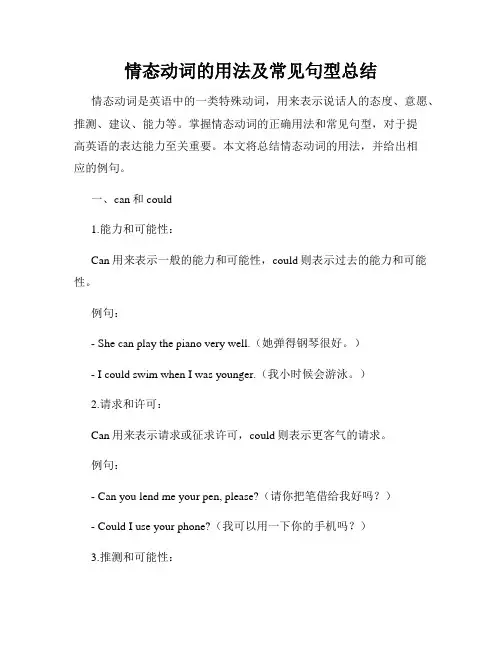
情态动词的用法及常见句型总结情态动词是英语中的一类特殊动词,用来表示说话人的态度、意愿、推测、建议、能力等。
掌握情态动词的正确用法和常见句型,对于提高英语的表达能力至关重要。
本文将总结情态动词的用法,并给出相应的例句。
一、can和could1.能力和可能性:Can用来表示一般的能力和可能性,could则表示过去的能力和可能性。
例句:- She can play the piano very well.(她弹得钢琴很好。
)- I could swim when I was younger.(我小时候会游泳。
)2.请求和许可:Can用来表示请求或征求许可,could则表示更客气的请求。
例句:- Can you lend me your pen, please?(请你把笔借给我好吗?)- Could I use your phone?(我可以用一下你的手机吗?)3.推测和可能性:Can用来表示对现在情况的推测,could则表示对过去或将来情况的推测。
例句:- He can't be at home now.(他现在不可能在家。
)- She could be late for the meeting.(她可能会迟到会议。
)二、may和might1.可能性和许可:May和might都用来表示可能性,表示较大的不确定性,也可用来征求许可。
例句:- It may rain tomorrow.(明天可能会下雨。
)- Might I borrow your umbrella?(我可以借你的伞吗?)2.推测和推测的反问:May和might还可用来表示对现在或将来情况的推测,也可用于反问句。
例句:- He may know the answer.(他可能知道答案。
)- Might I ask you a question?(我可以问你个问题吗?)三、shall和should1.意愿和建议:Shall常用于第一人称,表示意愿、提议或询问行程,should用于其他人称,表示建议或劝告。
情态动词的用法总结及例句解析情态动词是英语中常用的一类动词,用来表示说话人的态度、情绪、推测、能力等。
它在句子中通常与动词原形搭配使用,起到强调、修饰或者推测的作用。
本文将对情态动词的用法进行总结,并通过例句解析来帮助读者更好地理解。
一、情态动词的基本用法情态动词通常没有人称和数的变化,也没有时态的变化,后面接动词原形。
有以下几种情态动词:can,could,may,might,shall,should,will,would,must,ought to等。
1. 表示能力或可能性- I can swim.(我会游泳。
)- He may come to the party.(他可能会来参加派对。
)2. 表示允许或禁止- You may go now.(你现在可以走了。
)- You must not smoke here.(你不能在这里抽烟。
)3. 表示建议或命令- You should take a break.(你应该休息一下。
)- You ought to apologize to him.(你应该向他道歉。
)4. 表示推测或猜测- He could be there.(他可能在那里。
)- It might rain tomorrow.(明天可能会下雨。
)5. 表示义务或必须- We must finish the project on time.(我们必须按时完成这个项目。
)- You ought to help him.(你应该帮助他。
)二、情态动词的细分用法除了以上的基本用法外,情态动词还有一些特殊的用法,需要注意其具体含义和用法。
1. can 和 could- 表示能力和技能:I can play the piano.(我会弹钢琴。
)- 表示请求或许可:Can I use your computer?(我可以用你的电脑吗?)- could 还可以用来表示过去的能力或许可:When I was young, I could run very fast.(小时候,我跑得很快。
初中英语情态动词详细用法归纳(含练习及答案)情态动词有具体的词义, 但也同助动词一样, 需要与其他词语一起构成句子的谓语, 另外情态动词没有人称和数的变化, 情态动词后必须跟动词原形。
1.ca.的用法:(1).表示能力、许可、可能性.表示能力时一般译为“能、会”.即有种能力, 尤其是生来具备的能力.如:Sh.ca.swi.fast.bu..can’.. 她能游得很快, 但我不能。
.ca.se.wit.m.eyes.我用眼睛看。
could是can的过去式。
表示过去的能力.b.abl.t.d.sth.常常指经过努力,花费了时间和劳力之后才能做到某事。
is/am/ar.abl.t.d.sthwas/were able to do sth.(2).表示许可, 常在口语中。
如: .m.dictionary..你可以用我的字典。
(3).表示推测, 可能性, 意为“可能”.常用于否定句和疑问句中.此时can’.译为.不可能”.如:Ca.th.new.b.true.这个消息会是真的吗?—Ca.i.b.ou.teacher?那个人有可能是我们老师吗?—No.i.can’.b.ou.teacher.H.i.o..visi.t.th.Grea.Wall.不可能。
咱们老师正在游览长城呢。
【例题】—.thin.Mis.Ga.mus.b.i.th.library.Sh.sai.sh.woul.g.there.—No.Sh.__b.there..hav.jus.bee.there..A.can’.B.mustn’.C.needn’.D.wouldn’t【解析】根据下文“我刚去过那儿”可知, 应为“不可能”, can’t 表示推测[答案] Acould的用法:(1).can的过去式, 意为.能.会”, 表示过去的能力。
如: H.coul.writ.poem.whe.h.wa.10. 他十岁时就会写诗。
(2).could在疑问句中, 表示委婉的语气, 此.coul.没有过去式的意思。
1. can⑴ 表示能力,一般译为“能、会”,尤其指生来具备的能力。
如:She can swim fast, but I can’t .⑵ 表示许可,常在口语中。
如: Youcanuse my dictionary.⑶表示推测,意为“可能”,常用于否定句和疑问句中,此时 can’t 译为“不可能”。
如:—Can the news be true? — No, it can’t be our teacher. He is on a visit to the Great Wal l.2. could⑴ can 的过去式,意为“能、会”,表示过去的能力。
如: He could write poems when he was 10.⑵ could 在疑问句中,表示委婉请求的语气,此时 could 没有过去式的意思。
如:Could you do me a favour?—Could I use your pen? —Yes, youcan. (注意回答)3. may⑴ 表示请求、许可,比 can 正式,如: May I borrow your bike? Youmay gohomenow.⑵ 表示推测,谈论可能性,意为“可能,或许”,一般用于肯定句中。
如: Itmay raintomorrow . Shemay be at home.⑶ may 的过去式为 might。
might 也可以表示可能性低于 may (此时 might 没有过去式的意思)。
如: He is away from school. He might be sick.⑷ 表示希望、祈求、祝愿,常可译为“祝愿”。
通常是用 may +主+V如: May you have a good time.May you be happy!May you succeed !4. must⑴ must 表示主观看法,意为“必须”。
如: You must stay here until I come back.Must I hand in my homework right now?⑵对 must 引导的疑问句,肯定回答为 must,否定回答为 needn’t 或 don’t have to .如:— Must I finish my homework? —No, you needn’t.⑶ must 也可以表示有把握的推测,意为“ 一定,肯定”,用于肯定句。
情态动词造句情态动词造句情态动词不能表示正在发生或已经发生的事情,只表示期待或估计某事的发生。
大家不妨来看看小编推送的情态动词造句,希望给大家带来帮助!情态动词造句11.You may come anytime you want.Student may not sleep in class2.I would go to Norway one day.I would not choose this color.3.You should respect your teacher.You should not make noise when the baby is sleeping.4.I can speak 3 languages.I can not finish it in 1 hour.5.You must finish your homework before playing with the dog.You must not eat it up if you are full.情态动词及其用法1)情态动词不能表示正在发生或已经发生的事情,只表示期待或估计某事的发生。
2)情态动词除ought 和have 外,后面只能接不带to 的不定式。
3)情态动词没有人称,数的变化,即情态动词第三人称单数不加-s。
4)情态动词没有非谓语形式,即没有不定式,分词,等形式。
比较can 和be able to1)can could 表示能力;可能 (过去时用could),只用于现在式和过去式(could)。
be able to可以用于各种时态。
They will be able to tell you the news soon. 他很快就能告诉你消息了。
2)只用be able toa. 位于助动词后。
b. 情态动词后。
c. 表示过去某时刻动作时。
d. 用于句首表示条件。
e. 表示成功地做了某事时,只能用was/were able to,不能用could。
精品】情态动词详解 +例句一、单项选择情态动词1.Traveling by subway ___ s ometimes be quite an adventure, especially during the rush hour.C . shouldn't have been【答案】 D【解析】D . couldn't have been详解】 考查情态动词表推测。
句意:很多公司现在使用人工智能进行试验,这在几年前是不可能 的。
根据“a few years age 可知,此处表示 过去不可能”应该用couldn ' t have done 故D 项正确。
3.Mr. Baker, some students want to see you. they wait here or outside? A . MayB .ShouldC .ShallD .Will【答案】 C 解析】详解】 考查 Shall 的用法。
句意:贝克先生,有些学生想见你。
他们是在这里等还是在外面 等?Shall 用于第一、第三人称疑问句中,表示说话人征求对方的意见或向对方请示。
故选C 。
点睛】Shall 的用法Shall 作为助动词,一般用于第一人称 I 和We ,表示一个将来的动作,构成将来时态。
Shall 后面接动词原形。
例如:(1)I shall think it over and Let you know my idea. 我将考虑一下此事,然后告诉你我的想 法。
(2)We shall have a good time in the park. 我们在公园里会玩得很高兴的。
常考的特殊用法1. Shall 用于第一人称,表示征求对方的意愿。
如:A . must 【答案】B B .canC .shallD .should解析】 详解】 考查情态动词。
句意:乘地铁旅行有时可能相当冒险,尤其是在交通高峰期。
一、情态动词无人称和数的变化,不能单独做谓语,只能和行为动词或状态动词构成谓语二、情态动词分为:情态助动词:can(could)、may(might)、must、have to (had to )、ought to 、shall(should)、will(would) 12个半情态助动词:dare、need、used to、had better、would better(5个)三、情态助动词1.can and could1)ability:be able to do /manage to do/succeed in doing sth.eg.The army can defeat their enemy.eg.The army is able to defeat their enemy.eg.The army succeed in defeating their enemy.2)permission:eg.Can I smoke here?eg.You can’t smoke here.3)possibility:用在否定句、疑问句、感叹句中-eg.This can’t be done by him.当被用在肯定句中时,表达的是理论上的可能性,不涉及是否真的会发生eg.even expert drives can make mistakes.要表达现在或者将来的可能性,用may /might或could.eg.I may leave for Beijing next month.但在特殊疑问句中,或与副词hardly、only等连用的陈述句中表达可能性只用can/couldEg.where can the noise be coming from?eg.It can hardly be the postman,he comes only in the morning.4)有时会:the road can be blocked.5)could 表示轻微的怀疑或委婉的看法I’m sorry I couldn’t lend you the book now.His story could be true,but I hardly think it is.6)could 表示委婉的请求,主要用于疑问句,不用于肯定句Could you lend me some money?Yes,I can /No,I am afraid not.7)could 的常用结构:could+动词+比较级“非常,再.....不过了”It couldn’t be better.Couldn’t +过去分词+比较级“非常,再.....不过了”They couldn’t have tried harder to make me eel welcome.Can’t..too..=can never too“无论怎样...也不为过,越...越好”I can’t thank you too much.I owe my progress to you.Can’t (help/choose) but do/can but +动词原形“不得不,只好”We can but agree with him.Can’t help doing 忍不住,不得不I can’t help laughingCan’t be (it) 控制不住,没有办法It can’t be helpedCan’t....without 没有...就不能One can’t succeed without perseverance.2.may and might1)permission:May I use your pen?Yes,you may./No,you may not.2)Possibility:用于推测,表示不确定,不用于疑问句中She may know Tom’s address.出现I’m afraid.I’m not sure等表示不确定时,常用may/might.I’m afraid he might not come to attend the meeting today.从语气上判断,may表示的可能性比might 大,might更多的表示怀疑He may be very busy now.He might be very busy now.3)用于让步状语从句中However hard you may study,you cannot master English in a month.4)用于祈使句,表示祝愿May you succeed!5)might 常用于表示轻微的责备和委婉的请求You might post the letter for me if you are going near a post box.You might have let me know before!6)习惯用法:may as well do”理所当然,有足够的理由”She may be proud of her sonMay /might (just) as well do=had better do(最好)You might as well stay at home tonight.May/might as well+do A+as+do+B”与其做B不如做A”You might as well throw the money away as lend it to him.One may as well not know a thing at all as know it but imperfectly3.must and have to1)表示义务,一定要,必须You must arrive in good time.The meeting is very important.2)表示肯定性或难以避免,必然会,肯定会All men must die.3)must 表示有把握的推测,一定是,准时Must do/must be doing/must have doneThe tall fellow must be a basketball player.Let’s have something.You must be starving.He must have received mu letter which has mailed last week.4)must 表示非要,偏要,常以第二人称为主语,意指不耐或令人不愉快的事情,用于其他人称,表示主语固执,意为偏偏Why must you buy that car?Jane was never a pleasant young girl.After you gave her your advice,she must goand do the opposite.5)must 的三种否定形式表示不可能must be --can’t be must have done--can’t have doneYou must have met him before.You can’t have met him before.表示不必must do--need not to/don’t have toWe must get up at six tomorrow morning.We don’t have to get up at six tomorrow morning.表示决不能,严禁must--mustn’tYou mustn’t park your car here.6)回答以must提问的句子Must we clean all the rooms?Yes ,you must/No ,you don’t have to/No ,you needn’t7)must 可做名词,表示必须有的东西,必须做的事Warm clothes are a must in the mountains.8)must和have to 表示必须时,有一下差别Must 表示的是说话人主观的看法,而have to则往往强调客观需要The play is not interesting ,I really must go now.I have to work when I was your age.Must 一般只表现在,have to 则有更多的时态。